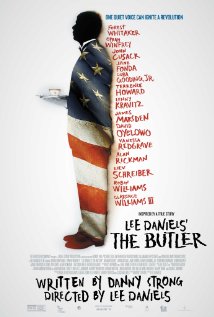Historical Freedom: "Butler" heavy-handed but moving and terrifically well-acted
Lee Daniels' The Butler (2013)
126 min., rated PG-13.
Normally, a director's name taking ownership of a film title might come off self-serving, but that's not the case with "The Butler"—excuse me—"Lee Daniels' The Butler" from Warner Bros. already owning the rights to a 1916 silent short of the same name. Tackling the Civil Rights Movement and race relations is a noble effort in itself, especially when movies within the studio system tend to sanitize and gloss over the painful truths with white-guilt clichés and Hollywood schmaltz. Director Lee Daniels (who officially broke out with 2009's unsparing powerhouse "Precious: Based on the Novel 'Push' by Sapphire" and went bat-crap crazy with 2011's overwrought Southern Gothic trash "The Paperboy") heightens the scope of his story and fills the film with so much passion and earnestness that it might be his most ambitious and well-meaning, and if it screams of Important, Eat-Your-Vegetables Oscar Bait, there's really nothing wrong with that.
Based on Wil Haygood's article "A Butler Well Served by This Election" and inspired by the true life of Eugene Allen, the film fictionalizes the real black butler and White House maître d' as Cecil Gaines (Forest Whitaker). Working alongside his father on a cotton farm in Macon, Georgia, in 1926, the 13-year-old Cecil witnessed his mother being raped by the plantation owner's white son (Alex Pettyfer) and his father being shot dead. The matriarch (Vanessa Redgrave) then brought Cecil into the house to be trained as a server, which, in later years, led him to work in a Washington D.C. hotel and eventually the White House under Eisenhower's administration in 1957. "You hear nothing, you see nothing, you only serve," he is told, before serving under eight U.S. presidents (though the film skips over Carter and Ford).
It's not a big flaw that liberties have been taken to dramatize Eugene Allen's story and impact on the White House and the Civil Rights Movement. While this story certainly could have spoken for itself, Danny Strong's fictionalized screenplay often rushes through history, checking off significant points and taking leaps, but the sections with Cecil and his family are more dramatically interesting than anything at 1600. In reality, Allen had one son, Charles, who served in Vietnam and survived. On screen, Cecil has two sons, Charlie (Elijah Kelley), dying in Vietnam, and the oldest, Louis (David Oyelowo), rebelling against his father and becoming an advocate as a Freedom Rider, a Black Panther, and later a congressional candidate and activist. It surely helps for Louis to be everywhere at the right time. Some of the edges might be softened, but more than often, director Daniels and screenwriter Strong deserve points for courageously facing the ugliness head-on. The opening scene set on a plantation is gut-wrenching, and one boldly powerful sequence should be singled out, as it intercuts between Cecil and his butlers setting up for a White House steak dinner as Louis and his Freedom Riders refuse to leave the whites-only section of a diner counter and face the brutal consequences with poker faces.
Director Daniels seems more than capable to round up a high-profile cast, pushing them and getting the most fearless performances out of them. As the butler, Whitaker does an understated and dignified interpretation of Eugene Allen, serving more as a passive conduit into the story of Louis. Really, it's Oyelowo who walks away with the film as the rabble-rousing Louis. If one can separate the talk-show juggernaut from the actress (who hasn't been on screen in sixteen years), Oprah Winfrey's raw, fiery but unflashy turn as Cecil's boozy, chain-smoking wife Gloria offers the most punch, even when she has to don some pretty unconvincing old-age makeup. Sitting at home and having an affair with a neighbor (Terrence Howard) while her husband serves, Gloria finally gets her wish to enter the White House in the 1980s.
Fortunately, Daniels' propensity for tawdry histrionics (remember Nicole Kidman's entire performance in "The Paperboy?") is kept in low gear this time around, though a "who's who" ensemble is full of the kind of stunt casting that might be distracting, spotting actors more or less impersonate a historical figure in wigs and waxy make-up. No one hams it up like a worker in a sausage factory, but none of them can really erase the thought that we're just watching actors, either, so it's actually a plus that they're only given a few moments apiece. The star-powered parade of window dressing includes Robin Williams, as Dwight D. Eisenhower; James Marsden, as John F. Kennedy; Liev Schreiber, as Lyndon B. Johnson; John Cusack, as Richard Nixon; Alan Rickman, as Ronald Reagan; and Jane Fonda, as Nancy Reagan. A recognizable face is around every corner, with Mariah Carey and Vanessa Redgrave each showing up for a brief while, as well as Lenny Kravitz and Cuba Gooding Jr., especially, dotting the film with humor as Cecil's fellow butlers.
It should go without saying, although some moviegoers think otherwise, that just because a film is inspired by a true story does not automatically equate it to high quality. On the other hand, while "Lee Daniels' The Butler" occasionally creaks with a heavy hand and recalls a little "Forrest Gump," it's still worthwhile and surprisingly entertaining.
Grade: B











Comments
Post a Comment